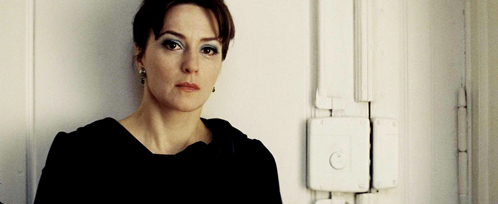|
Reviews of Recent Independent, Foreign, & Documentary Films in Theaters and DVD/Home Video
Written & Directed by: Florian Henckel von Donnersmarck. Produced by: Quirin Berg & Max Wiedemann. Director of Photography: Hagen Bogdanski. Edited by: Patricia Rommel. Music by: Gabriel Yared & Stéphane Moucha. Released by: Sony Pictures Classics. Language: German with English subtitles. Country of Origin: Germany. 137 min. Rated: R. With: Martina Gedeck, Ulrich Mühe, Sebastian Koch, Ulrich Tukur, Thomas Thieme, Hans-Uwe Bauer, Volkmar Kleinert & Matthias Brenner.
The odds of my meeting an East German who had worked for or cooperated with the Stasi weren’t out of reach. Roughly 100,000 worked for the organization and another 200,000 were informers, divulging tips on their family and friends. The total population was 17 million. A refreshing alternative to the whimsical and nostalgic look back on Communist life in Good Bye Lenin!, The Secret Lives of Others takes place in the mid-1980s, the last gasp of hard-line communism before the arrival of Gorbachev and Perestroika. The bravura opening prologue, of a police training course taught by the eagle-eyed Captain Gerd Wiesler (Ulrich Mühe), is a how-to demonstration on how to crack a dissident’s defense. An old school friend of his, Lieutenant Colonel Grubitz (Ulrich Tukur), has been promoted to head the secret service’s culture department, keeping an eye on the country’s artists. After being given the go-ahead from a higher-up, the kowtowing Grubitz assigns Wiesler to investigate celebrated playwright Georg Dreyman (Sebastian Koch) to determine whether he actually is, as rumor has it, non-subversive. Like clockwork, the service breaks into the writer’s apartment and plants listening devices throughout. Eavesdropping 24/7 with a video camera monitoring the writer’s apartment building, Wiesler immerses himself in the lives of Dreyman and his willowy live-in girlfriend Christa-Maria (Martina Gedeck), a noted actress who has her own secret (or two). Staunch party loyalist Wiesler carries out his duty by the book until he realizes the actual motivation for the surveillance, which has nothing to do with ideology. Like an unobserved and silent dues ex machina, he begins to pull strings, affecting his targets’ lives. Writer/director Florian Henckel von Donnersmarck has created a terrific McGuffin, the smoking gun that could incriminate Dreyman, sustaining suspense on a level of a John le Carré novel, though without the layered characters. Only the punctilious, workaholic Wiesler is vividly written. Dreyman, on the other hand, never strays from the discreet noble artist, and the fragile Christa-Maria is an enigma, neatly fitting the function of the tragic, self-destructive actress. The film concludes with an extended epilogue, which lasts a tad too long. It could be argued that von Donnersmarck, like the omnipresent Wiesler, has a firm and controlling grip, not ready to relinquish his hold on the audience. However, the simple, no frills camera work is a reminder of how powerful a series of over-the shoulder shots can be – and wholly appropriate for
the intense interrogation scenes. This direct approach aligns this cold war saga with last year’s docudrama Sophie Scholl about the famous
Nazi dissident. Granted, the two films deal with different eras and ideologies, but both vividly depict the larger political culture (really the
films’ main characters), states built on and propelled by fear, whether of the Third Reich’s impending military defeat or the lure of the
wealthy West.
Kent Turner
|

